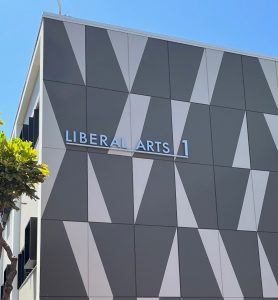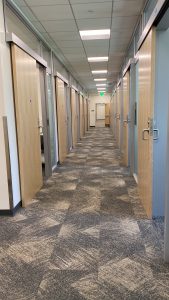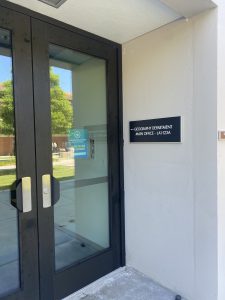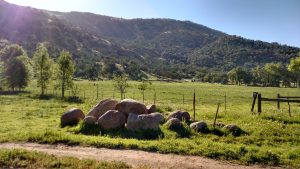Mary Venegas earns Best Masters Thesis!
Mary Venegas is one of only two recipients of the College of Liberal Arts Best Master’s Thesis award winners. These graduate students are recognized for their outstanding scholarship. This award recognizes her outstanding scholarship in her thesis research titled: “Vulnerabilities and Resilience to Weather Events: Woodford Saint Andrew, Jamaica”. We also congratulate her Thesis Supervisors – Dr. Gary Hytrek (THesis Chair), Dr. Lily House-Peters (2nd Reader) and Dr. Dmitrii Sidorov (3rd Reader).
Kate Prell wins coveted 2024 Dean’s List of Graduate Master’s Students
Kate Prell was selected as a 2024 Dean’s List of Graduate Master Students award recipient from the College of Liberal Arts at CSULB. The University presents this award each year to graduate students who have a record of academic excellence. The number of recipients from each college is limited to one percent of the students pursuing a graduate degree. This year, the College of Liberal Arts was privileged to select 6 students for this special award. Congratulations Kate!
Graduate Students publish research
Two of our MA students – Luis Mendiola Luna and Alejandro Beltran – collaborated on a recent publication with Dr. Lauren Heidbrink in Human Development!
https://www.tandfonline.com/doi/full/10.1080/26906015.2024.2301945
Luis Mendiola Luna, Alejandro Beltran, Martha Fuentes, Fatima Zeferino & Lauren Heidbrink (12 Feb 2024): Inclusive Undergraduate Research Opportunities for Undocumented Students, Journal of First-generation Student Success, DOI: 10.1080/26906015.2024.2301945
Kate Prell wins President’s Outstanding Presentation Award @ 2023 APCG
Kate Prell wins President’s Outstanding Presentation Award at the October 2023 Association of Pacific Coast Geographers (APCG) 2023 Conference in Ventura, California,
Geography has Moved! Visit us in our new spaces and places!
Geography has a new space and place on campus! The Department of Geography has moved to our new home on the first floor of LA1 in the LA1-123A suite! Our faculty offices and graduate student spaces are located on the 1st floor and you will find our two brand new geospatial labs on the 3rd floor in LA1-301 and 303. We are grateful to the administration and facilities for the support through this years’ long process. Please come visit us! 



Dr. Hyowon Ban introduces the Metaverse at Spring 2023 Colloquium
On April 24th, Dr. Hyowon Ban treated Geography students and faculty to her colloquium titled Practice of Geography Research and Teaching in the Metaverse. To find out more about this virtual environment that parallels the physical world, please check out Dr. Ban’s PowerPoint presentation.
Cameron Mayer MA earns Best Masters Thesis Award!
Congratulations to Cameron Mayer for being selected as the College of Liberal Arts best Masters Thesis 2023! His thesis: New West Tension and Threatened Species Protection: The Western Joshua Tree Conservation Debate in the Morongo Basin, California was chaired by Dr. Monica Argandona, with Dr. Paul Laris and Dr. Lily House-Peters as readers.
The Best masters Thesis is a very competitive and prestigious award in the College of Liberal Arts. Geography has had four winners since 2018.
2023: Cameron Mayer – New West Tension and Threatened Species Protection: The Western Joshua Tree Conservation Debate in the Morongo Basin, California
2022: Julia Rose Dowell – Taking the Temperature of Climate Change in Long Beach: Concerns and Responses of Long Beach Residents Regarding Extreme Heat and Health Impacts
2021: Andrew Siwabessy – Geologic mapping of Terra Cimmeria, Mars, and resultant implications for the Martian plate tectonics hypotheses
2018: Rebecca Jacobs – Determinants of Fire Intensity in a Mesic West Africa Savanna: A Statistical Analysis of Fire Characteristics
Dr. Hytrek’s work creating a participatory budget process for youth featured in the LB Business Journal
Dr. Hytrek’s contributions to the participatory budget process featured in the Long Beach Business Journal
“…You don’t read a manual and learn how to ride a bicycle. You ride a bicycle by riding a bicycle,” Hytrek said. “People learn how to become citizens, residents of communities, by doing the work, but often … there aren’t those opportunities, and PB creates those opportunities…According to Hytrek, a participatory budget process is one of the most effective ways to deepen and broaden democracy within communities…“
CSULB Geography now accepting applications to the Master of Arts and MSGISci programs
The Geography Department is now accepting applications to our Master of Arts and Master of Science in Geographic Information Science (MSGISci) graduate programs! Applications for Fall 2023 will be accepted until June 1, 2023, with application review beginning in April.
Geography Master of Arts Program
Geography at the CSULB supports a breadth of research interests, focusing on environmental and physical geography, geospatial science, human geography, housing and social justice, global and urban studies. Explore faculty research interests here: http://www.cla.csulb.edu/departments/geography/ We can offer competitive funding opportunities, including research and teaching assistantships as well as lab technician positions. For more information on the MA Program, please contact Dr. Gary Hytrek, MA Graduate Advisor at gary.hytek@csulb.edu or click here: https://cla.csulb.edu/departments/geography/graduate/
Master of Science in Geographic Information Science
The Master of Science in Geographic Information Science degree program (MSGISci) at CSULB is a one-year, 30-unit professional program that provides students with advanced analytic and technical training in geospatial technologies and incorporates professional skill building to prepare graduates for the geospatial workforce. Please contact Dr. Suzanne Wechsler, Program Director at Suzanne.Wechsler@csulb.edu for more information, or click here: https://www.cpie.csulb.edu/courses/master-of-science-in-geographic-information-science
Geography’s REU at River Ridge Ranch enters 2nd year!
CSULB’s Geography Department received a $344,000 grant from the National Science Foundation to run a three-year Research Experience for Undergraduates (REU) program in California’s scenic western Sierra Nevada foothills. The program is hosted by River Ridge Ranch and Institute in Springville, California, begain in May 2022 and runs through 2024. Eight undergraduate students from around the U.S. will be accepted into the eight-week program each year. According to award recipient and Principal Investigator Dr. Paul Laris, “this project brings together eight undergraduate students with faculty for an eight-week intensive research and learning experience to study the science and technology of environmental conservation.” Laris added “the objective of the program is to train the next generation of land managers and restoration scientists in conservation science and technology.” Information about the grant and application procedures can be found at https://cla.csulb.edu/departments/geography/nsf-reu/. For a local take on the program, please see the February 16, 2022 article that was posted in the Porterville Recorder.
for Undergraduates (REU) program in California’s scenic western Sierra Nevada foothills. The program is hosted by River Ridge Ranch and Institute in Springville, California, begain in May 2022 and runs through 2024. Eight undergraduate students from around the U.S. will be accepted into the eight-week program each year. According to award recipient and Principal Investigator Dr. Paul Laris, “this project brings together eight undergraduate students with faculty for an eight-week intensive research and learning experience to study the science and technology of environmental conservation.” Laris added “the objective of the program is to train the next generation of land managers and restoration scientists in conservation science and technology.” Information about the grant and application procedures can be found at https://cla.csulb.edu/departments/geography/nsf-reu/. For a local take on the program, please see the February 16, 2022 article that was posted in the Porterville Recorder.
